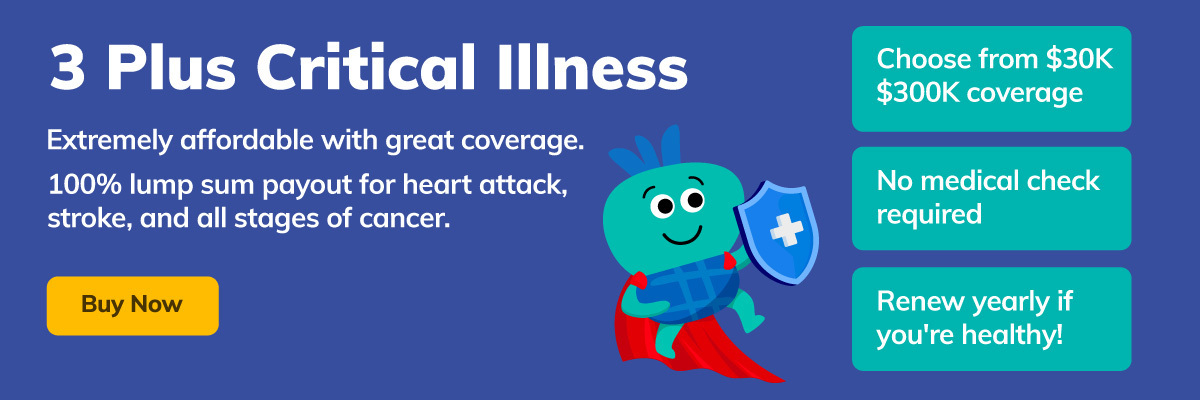So you’re thinking about getting a critical illness plan, or maybe you already have one or several critical illness plans. Though nobody hopes to actually make a claim from these policies, there are a few essential things you need to know about critical illness insurance claims to ensure you get the support you need during crucial periods.
Key Takeaways
- Things to note when purchasing critical illness insurance
- What the claims procedure is like
Things to note when you buy a critical illness plan
Policy Coverage Details
Before purchasing a critical illness insurance policy, it’s essential to understand precisely what it covers. Policies can vary widely, so review the terms and conditions carefully. Ensure you know the specific illnesses covered and any exclusions that may apply. Some policies also offer optional riders for additional coverage, so consider your needs and budget when customising your policy.
Beneficiary Designation
When you purchase a critical illness insurance policy, you can choose to designate a beneficiary. The beneficiary is the person or entity who will receive the payout in the event of your diagnosis of a covered critical illness. It’s crucial to keep your beneficiary designation up to date to ensure that the payout goes to the intended recipient.
Typical claims procedure
1. Diagnosis of a Covered Condition
The critical illness claims process begins with a diagnosis by a qualified medical professional of one of the severe illnesses specified in your insurance policy. These can include conditions like cancer, heart attack, stroke, organ failure, and others, depending on the terms of your policy.
2. Filing a Claim
Once you are diagnosed with a critical illness covered by your policy and have met the waiting and survival periods, you can begin the claims process. This typically involves contacting your insurance company, providing the necessary medical documentation, and filling out the required claim forms. Most insurance providers have dedicated claims departments to assist policyholders through this process.
The insurance company will require specific documentation to support your claim. This documentation typically includes:
- Medical reports and records detailing your diagnosis.
- Test results and diagnostic imaging reports.
- Proof of the waiting period and survival period requirements being met.
- Completed claim forms provided by the insurer.
3. Review and Evaluation
After receiving your claim documentation, the insurance company will review and evaluate the information to determine if your claim is valid. They may consult with medical professionals to verify the diagnosis and assess whether it falls within the policy’s coverage.
4. Claim Approval or Denial
After submitting your claim, the insurance company will review the documentation and assess whether it meets the policy’s criteria for a payout. The length of this review process can vary depending on the complexity of your case and the efficiency of the insurer. Singapore’s insurance regulatory authorities have guidelines to ensure that insurers process claims promptly and fairly.
Once the insurer has completed its assessment, they will inform you whether your claim has been approved or denied. If approved, they will outline the amount of the payout you are eligible to receive. If denied, the insurer will provide reasons for the denial.
5. Payout Process
If your claim is approved, the insurance company will initiate the payout process. Typically, this involves disbursing a lump sum payment to you, which you can use as needed to cover medical expenses, living costs, or any other financial needs during your illness.
There are also other types of payout plans, such as early-stage critical illness plans, which pay out during early to intermediate stages of critical illness, late-stage critical illness plans, which pay out at later stages, as well as multi-pay plans, which allow you to claim for multiple conditions.
Did you know that Tiq 3 Plus Critical Illness insurance covers you up to S$300,000 without a medical check required? Policyholders receive a 100% lump sum payout in the event of heart attack, stroke, or any stage of cancer.
Other important points to remember
Premium Payments during Claims
Some critical illness policies may require you to continue paying premiums during the claims process, while others may waive premiums during this time. Check your policy terms to understand whether you need to make premium payments after a claim is approved.
Seek Professional Assistance
If you encounter any difficulties or have questions during the claims process, consider seeking assistance from an insurance agent, financial adviser, or legal counsel. They can help you navigate the complexities and ensure you receive the benefits you’re entitled to.
Ready to Buy Critical Illness Insurance?
Remember that the specific steps and requirements of the critical illness claims procedure may vary depending on your insurance policy and the insurance company. It’s essential to carefully review your policy documents and contact your insurer promptly after a diagnosis to initiate the claims process and receive the financial support you need during a challenging time.
To navigate this process effectively, it’s essential to understand the terms and conditions of your policy, maintain timely premium payments, and promptly initiate the claims process upon diagnosis. With the right critical illness insurance policy for you, you can gain peace of mind knowing that your financial well-being is safeguarded in the face of life’s uncertainties. Learn more about Tiq 3 Plus Critical Illness today.
[End]
Information is accurate as at 13 October 2023. This policy is underwritten by Etiqa Insurance Pte. Ltd. (Company Reg. No. 201331905K).
This policy is protected under the Policy Owners’ Protection Scheme which is administered by the Singapore Deposit Insurance Corporation (SDIC). Coverage for your policy is automatic and no further action is required from you. For more information on the types of benefits that are covered under the scheme as well as the limits of coverage, where applicable, please contact us or visit the Life Insurance Association (LIA) or SDIC websites (www.lia.org.sg or www.sdic.org.sg).
You should seek advice from a financial adviser before deciding to purchase the policy. If you choose not to seek advice, you should consider if the policy is suitable for you.
As this product has no savings or investment feature, there is no cash value if the policy ends or if the policy is terminated prematurely.
This advertisement has not been reviewed by the Monetary Authority of Singapore.
Tiq by Etiqa Insurance Pte. Ltd.
A digital insurance channel that embraces changes to provide simple and convenient protection, Tiq’s mission is to make insurance transparent and accessible, inspiring you today to be prepared for life’s surprises and inevitabilities, while empowering you to “Live Unlimited” and take control of your tomorrow.
With a shared vision to change the paradigm of insurance and reshape customer experience, Etiqa created the strong foundation for Tiq. Because life never stops changing, Etiqa never stops progressing. A licensed life and general insurance company registered in the Republic of Singapore and regulated by the Monetary Authority of Singapore, Etiqa is governed by the Insurance Act and has been providing insurance solutions since 1961. It is 69% owned by Maybank, Southeast Asia’s fourth largest banking group, with more than 22 million customers in 20 countries; and 31% owned by Ageas, an international insurance group with 33 million customers across 16 countries.
Discover the full range of Tiq online insurance plans here.








